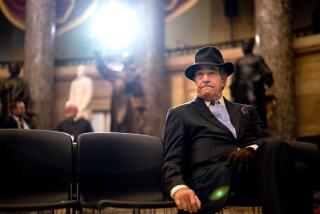3 Reportedly Accuse Mandela of Beatings
JOHANNESBURG, South Africa â Three young men who were allegedly assaulted at Winnie Mandelaâs home say she personally initiated the attacks, using her fists and a rawhide whip to beat them and a teen-ager, who later died, according to sources who have seen the menâs affidavits.
After Mandelaâs attack, the men claim, Mandelaâs live-in bodyguards--known as the Mandela United soccer club--took over, attacking the men with whips and bottles and throwing them against the walls.
Stompie Mokhetsi Seipei, 14, whom Mandela had accused of being a police informant, was suspended by his feet and repeatedly dropped on his head until he was no longer coherent, the affidavits say. He was taken from the house by the bodyguards two days later. His body, beaten beyond recognition and stabbed twice, was found in a field on Jan. 7.
Mandela refused several requests for interviews for this story, and her husband is said to have urged her to refrain from public comment.
The graphic descriptions of the night of Dec. 29, when the four blacks were allegedly kidnaped from a Methodist church hostel in Soweto and held at Mandelaâs home, are contained in secret sworn statements the surviving men made to their attorney. Affidavits, which are written statements made under oath, are not legal charges.
While the menâs attorney would not comment, details of the affidavits were obtained by The Times from other sources in the anti-apartheid movement familiar with both the statements and the efforts of civic leaders to win the menâs freedom. All the sources spoke on the condition that their names not be used.
Acting on their own interviews with the victims, the authorities have charged Jerry Richardson, 41, the Mandela United coach, and a team member with murder. Police say the investigation is continuing.
The kidnaping and death of Seipei, a respected anti-apartheid activist, has created an outcry in the black liberation movement, where the 54-year-old wife of nationalist leader Nelson R. Mandela is known for her erratic behavior but also for her courageous stands against South Africaâs white minority-led government and its system of racial separation known as apartheid.
Internal anti-apartheid groups have urged blacks to distance themselves from Mandela. Her husbandâs African National Congress, from its headquarters in exile, has criticized her judgment but stopped short of ostracizing her.
Detrimental Effects Feared
Many anti-apartheid leaders, including sources for this story, have expressed concern about detrimental effects that the case may have on the anti-apartheid movement. They also point out that the men making the accusations against Winnie Mandela and her bodyguards are themselves anti-apartheid campaigners and strong supporters of Nelson Mandela.
Nelson Mandela, serving a life sentence at a prison farm near Paarl, is widely revered among South Africaâs voteless black majority as their natural leader.
None of the three men making the affidavits claim to have been seriously injured by Mandelaâs attacks, although they are said to still have scars and other marks from the more severe beatings meted out by Mandelaâs bodyguards--often, they said, while she watched.
Their statements about Mandelaâs actions raise the possibility that she may eventually face charges in the case. If she is not charged, lawyers say, Mandelaâs reputation could be injured by the testimony from a trial of her bodyguards. One source says the affidavits portray Mandelaâs role as one of âcommanding generalâ rather than observer.
In recent weeks, Mandela has said that her associates took the young men from the church house to protect them from the sexual advances of the Rev. Paul Verryn, a white Methodist pastor who runs the hostel. She has denied that Seipei, identified by police fingerprint experts and buried last weekend, is dead. She also has accused the countryâs leading anti-apartheid groups of being infiltrated by government agents.
Sources say the affidavits, and statements by two of the abducted men at a Soweto community meeting hours after their release Jan. 16, give the following account:
Seipei and the three men, aged 20, 20 and 29, were kidnaped about 8 p.m. four days after Christmas at Verrynâs church house by a group of Mandela United members, led by team coach Richardson. They say they were taken to Mandelaâs large red-brick home in Diepkloof Extension, a well-to-do Soweto neighborhood.
At the house, the affidavits say, they accepted the teamâs offer of something to eat. Then, about an hour later, Mandela arrived and, with members of the live-in soccer team watching, she punched and used a whip known as a sjambok to hit Stompie Seipei and the oldest of the men.
She demanded that Seipei admit to being a police informant, but he refused, according to the affidavits. Then she demanded that all three of the older men admit that Verryn, the church house pastor, was a homosexual who had made sexual advances toward them.
(The Methodist Church has said its own investigation has cleared Verryn of any misconduct, and leading anti-apartheid officials in Soweto, where Verryn and the church are respected for providing shelter for young homeless activists, also have come to his defense. However, police say they are investigating the allegations against Verryn.)
In the affidavit, the three men say the attacks on them subsided later that first night. But they say that Seipei, who stood 4 feet tall, was beaten so badly by the team that his eyes were swollen and he was unable to eat. On New Yearâs Day, Stompie was taken away by Mandelaâs bodyguards, the men say.
After that, the three men say, they were forced to act as soccer team members, performing household chores at Mandelaâs home and even, in one case, going on a foray into the township to assault a former team member. They also attended a township funeral, wearing the teamâs uniforms.
On Jan. 7, 10 days after the abduction, one of the men escaped while on guard duty at the home and told his story to community activists, who began a series of urgent meetings with Mandela to obtain the release of the remaining two. They were released on Jan. 16 after the intervention of Nelson Mandela, through his attorney, and members of the Mandela Crisis Committee, composed of respected political activists.
The three men remain in the care of the Methodist church, which refuses to divulge their whereabouts. They are said to fear revenge from the soccer clubâs two dozen members.
No one knows what triggered the alleged abduction in the first place. Some sources believe it may have stemmed from disagreements at the church house between Xoliswa Felati, a 35-year-old mother of two with close ties to Mandela, and other residents.
Felati was said to have threatened to bring the Mandela United members to the house to show the young men âwhat discipline really is,â said one source who has interviewed house residents.
In interviews with the South African police on Feb. 17, the three men told stories similar to those related in their affidavits, sources say. Two days later, the authorities staged a six-hour raid at Mandelaâs house, arresting four team members and taking samples of what they said were blood-stained clothing.
More to Read
Sign up for Essential California
The most important California stories and recommendations in your inbox every morning.
You may occasionally receive promotional content from the Los Angeles Times.











